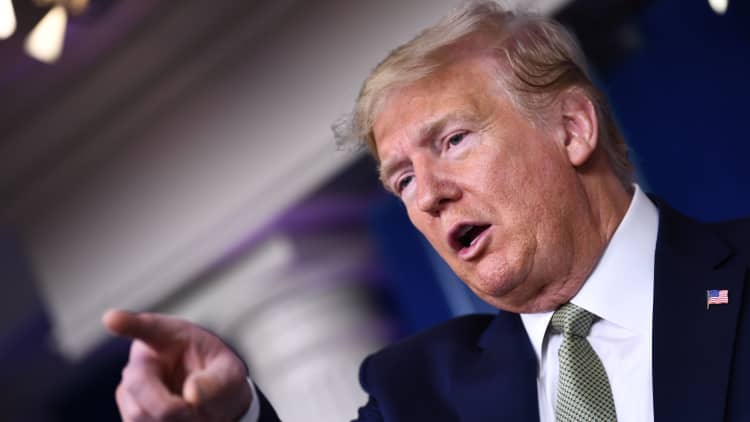President Donald Trump on Friday said he will use the Defense Production Act in response to the deadly coronavirus pandemic.
The Korean War-era statute can force certain American companies to produce materials that are in short supply in the face of the growing outbreak.
During Friday's coronavirus task force briefing, Trump said the administration on Thursday night "put it into gear," adding that he has already spoken with multiple companies about it.
"Most of the states, in no way did they do anything wrong, they were stocked up," Trump said on Friday. "They were all equipped. Unfortunately they've never had a thing like this. So they need help from the federal government."
Trump would not identify any manufacturers, but said, "We're working with one [automaker] in particular, the ones that make ventilators," he said. "They say they've done it before, which surprises me, but they can do it very easily."
When pressed, he added that General Motors was one of the companies that has already said it would aid in production of necessary supplies.
The Defense Production Act, an option the administration had been mulling for weeks, gives the U.S. government significant authority in the realm of national defense.
By invoking it, the president can compel American companies to suspend their normal production schedules and begin manufacturing particular materials needed in time of a crisis.
In this case, the administration can work with companies to ramp up production of protective gear needed by health professionals on the front lines of the crisis as hospitals, stores and testing centers warn that they're experiencing shortages in medical masks, ventilators, gloves, testing swabs and other essential equipment.
New York Gov. Andrew Cuomo said on Thursday that the state has about 5,000 ventilators but anticipates needing 30,000. New York has the most confirmed cases of the coronavirus out of all 50 states.

The need is so extreme that health-care workers have begun to create makeshift masks and safety goggles to protect themselves.
Congressional lawmakers pushed Trump to invoke the Defense Production Act in a letter signed by 57 Democrats sent to the White House last week.
"Failure to act now could result in even more severe shortages that force healthcare workers to make harrowing choices and endanger American lives," the letter said. "Consequently, we urge you to use the presidential authorities granted by the Defense Production Act to mitigate these shortages without delay."
Senate Minority Leader Chuck Schumer was among those who pressed Trump on it, asking him to immediately invoke the act in a phone call Friday morning.
Trump said in a tweet Wednesday that he "signed the Defense Production Act" but that its powers would only be used "in a worst case scenario."
"I only signed the Defense Production Act to combat the Chinese Virus should we need to invoke it in a worst case scenario in the future," Trump tweeted Wednesday. "Hopefully there will be no need, but we are all in this TOGETHER!"
The coronavirus, which is believed to have originated in Wuhan, China, has spread to dozens of countries globally, with more than 245,000 confirmed cases worldwide and at least 10,031 deaths so far, according to data from Johns Hopkins University. There are at least 14,250 cases in the United States and at least 205 deaths, according to the latest tallies.


